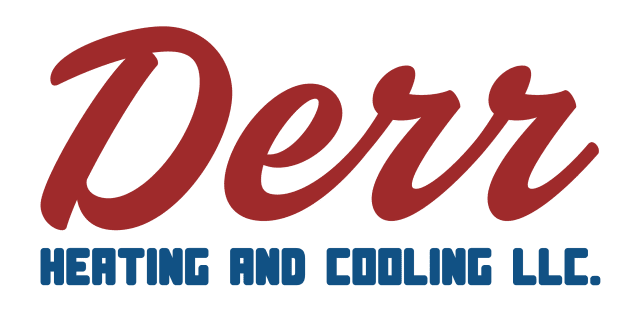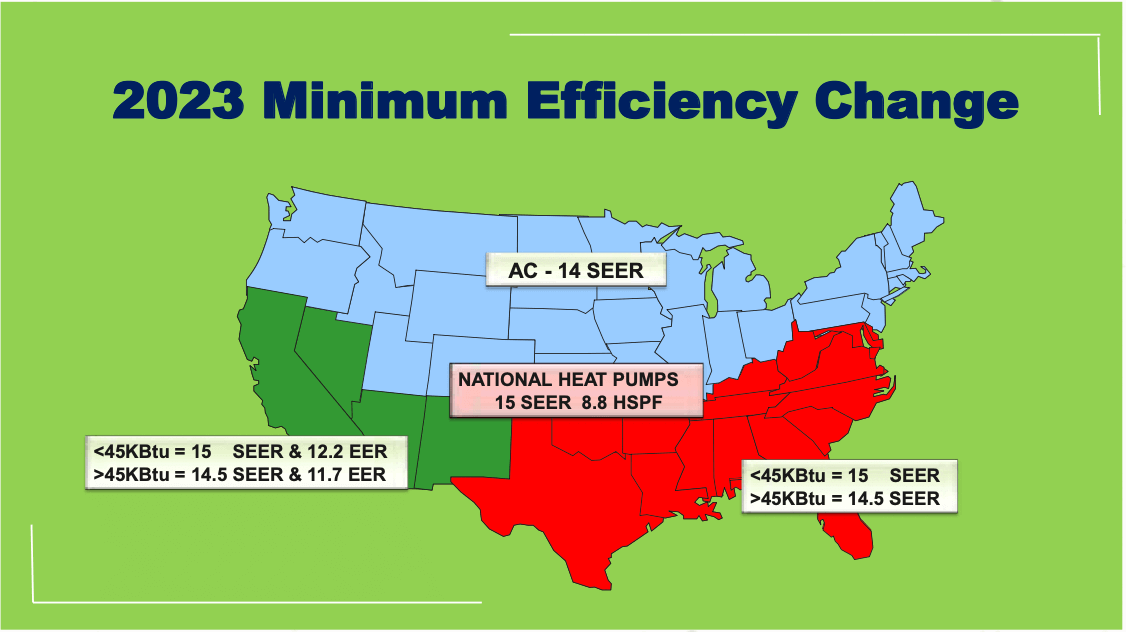The world of HVAC equipment will take a big step forward in efficiency and eco-friendliness in 2023.
What Is Changing in 2023?
The U.S. Department of Energy (DOE) will raise the minimum efficiency standards for air-source heat pumps and central air conditioners starting next year.
Systems sold in the U.S. beginning Jan. 1, 2023, must meet those minimum standards.
The seasonal energy efficiency ratio (SEER) describes cooling system efficiency. The higher the number, the more efficient the unit is. The number represents the unit’s output during the cooling season divided by the amount of electricity the unit used over that same period.
Currently, the efficiency baseline is 13 SEER for heat pumps and air conditioners installed in homes in the northern half of the U.S. and 14 SEER for equipment in the southern half.
Next year the minimum standard goes to 14 SEER for northern states and 15 SEER for southern states.
Heating Efficiency
The minimum rating for heating efficiency also will increase for air-source heat pumps. The heating seasonal performance factor (HSPF), which describes heat pump efficiency, will increase from 8.2 to 8.8.
The federal government will not require you to replace your older heat pump or air conditioner when the minimum standards change next year. However, if you decide to install new equipment in 2023, you will not be able to buy a 13 SEER model. Your new equipment must be rated 14 SEER at minimum. Your new heat pump also must carry an HSPF rating of 8.8.
How to Save Money
According to the U.S. Energy Information Administration (EIA), the new standards will result in huge savings on utility costs for consumers. The agency estimates that households with air conditioners or heat pumps collectively will save $2.5 billion to $12.2 billion over the next 30 years on energy bills.
If your air conditioner or heat pump is older than 15 years, consider upgrading to a high-efficiency model. New equipment offers more energy-saving features, such as two-stage and variable speed compressors and blower motors.
Single-stage compressors, for example, work at capacity all the time.
Two-stage and variable speed compressors operate at lower speeds and use less energy most of the time. They also can run at capacity when the temperature rises.
Our Gillette Heating and Air experts can help you determine which features fit your lifestyle and comfort needs. We are proud to offer Carrier products for your Spanish Fork home.
Our Gillette Heating and Air experts can help you determine which features fit your lifestyle and comfort needs. We are proud to offer Carrier products for your Spanish Fork home.
New Refrigerants in 2023
The other significant HVAC change in 2023 involves the kind of refrigerant manufacturers will use in all new air conditioners and heat pumps.
Since 2010, residential cooling systems have contained a refrigerant called R-410a, a hydrofluorocarbon (HFC). This refrigerant has high global warming potential and could harm the environment if it leaks from a cooling system. For that reason, the U.S. Environmental Protection Agency (EPA) is phasing down the manufacture and importation of HFCs by 85 percent over the next 15 years.
Beginning next year, new cooling systems will contain a refrigerant with a lower global warming potential. Several manufacturers, including Carrier, will build heat pumps and air conditioners compatible with R-454b. This refrigerant is more environment-friendly than its predecessors but also mildly flammable. We cannot retrofit existing equipment to use the new refrigerant.
Although R-410a will be available for equipment repairs over the next few decades, no new air conditioners or heat pumps will contain R-410a beginning next year.
Purchasing a new cooling system with your preferred refrigerant is all in the timing. If you want a new unit with R-410a, buy it this year. You will start saving money immediately on utility bills by upgrading to a high-efficiency system.
Purchasing a new cooling system with your preferred refrigerant is all in the timing. If you want a new unit with R-410a, buy it this year. You will start saving money immediately on utility bills by upgrading to a high-efficiency system.
If you prefer R-454b, called Puron Advance in Carrier products, wait until 2023. Our trained professionals can walk you through the pros and cons.





